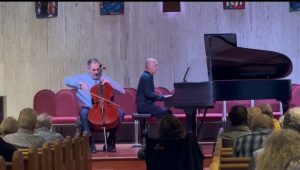
By Robert Croan
An excellent series that has garnered too little attention is FilAm Music Foundation’s Chamber Music@ Lauderdale-by-the-Sea, at The Community Church on Bougainvillea Drive. The most recent event, on Feb. 22, was a superb recital by cellist Evan Drachman and pianist Victor Santiago Asunción, who is also FilAm’s founder and director.
Drachman happens to be the grandson of legendary cellist Gregor Piatigorsky, and he plays the elder musician’s 1725 Stradivarius instrument.
Drachman, in turn, is artistic director of the Piatigorsky Foundation, with the mission of bringing live classical music to underserved communities. The mission of the present concert, however, was music making, pure and simple — or perhaps, not so simple, as it was a serious program centered on Johannes Brahms’s craggy and intense Cello Sonata No. 1 (in E minor, Op. 38) — stern stuff, an homage to Johann Sebastian Bach, with two of its movements based on themes from Bach’s The Art of the Fugue.
The concert opened on a lighter note, however: Beethoven’s Variations on Mozart’s “Bei Männern,” the exquisite duet for Pamina and Papageno from the opera The Magic Flute. The instrumental take on that piece, the text of which deals with naïve but profound statements about love, is a fun-filled romp through passion, yearning, jealousy, anger and possible fulfillment, and these two artists made it fun — not just for the audience but apparently for themselves as well.
Both performers have an ear for tonal color — in the case of the cellist, aided by that magnificent rare Strad. Drachman’s variety of nuance conveyed the gamut of emotions, while the keyboard collaboration offered a counterpart that had a personality of its own.
When they came to Brahms, the duo got right down to business with a passionate, incisive rendition of the knotty opening Allegro, a musical statement of affection by the young Brahms to Clara Schumann, the wife of his host and mentor, composer Robert Schumann. Asunción’s keyboard work was no mere accompaniment but that of an equal, often a leader in the musical conversation. He took full advantage of the piano’s bright tone to counter the abundant darkness of his colleague’s cello.
The pianist’s pearly timbres were particularly advantageous in the middle movement — an old-fashioned (for its time) minuet and trio — which is a brief, lighter break from the sonata’s overall gravity.
The final movement, a fugue in further deference to Bach, was intricate yet clear in texture and voice leading among each player’s individual lines.
What seemed like harshness of tone in some of Drachman’s playing in the first two pieces was ostensibly intentional, as he altered his sound later to emphasize his instrument’s sweetly lyrical capabilities. An emotional high point came with Bruch’s Kol Nidrei, a setting of the Hebrew prayer that introduces Yom Kippur, the Jewish day of atonement and the most sacred day of the year.
The cellist introduced the piece by describing this music’s special meaning to him, and the heartfelt performance, on the part of both players, illustrated his words. It was as if the performer and the instrument itself were capable of just about any sound within the range of human hearing.
He followed with a charming rendition of a Chopin Nocturne (No. 20 in C-sharp minor, Op. posth.) arranged by Piatigorsky for cello and keyboard, then concluded with Saint-Saëns’s all-time favorite, “The Swan,” from The Carnival of the Animals.
Midway in the concert, while Drachman took a break, Asunción played two solo pieces by the iconic Schumanns: a Romance by Clara Schumann and Liszt’s piano arrangement of Robert Schumann’s passionate German Lied, “Widmung.” This little interlude was in fact a highlight in itself, with Asunción’s command of color, phrasing and nuance seemingly infinite within each of these little gems’ short duration.
These two players are major league artists who should be more prominent on today’s music scene, and Asunción’s modest but valuable series in Lauderdale-by-the Sea deserves to be better known (and better attended) than it is. There are two more events this season: Violinist Kevin Zhu, playing all 24 Paganini Caprices on March 22; and another violinist, Diomdedes Saraza Jr., performing with a small Baroque ensemble on April 26. Highly recommended!